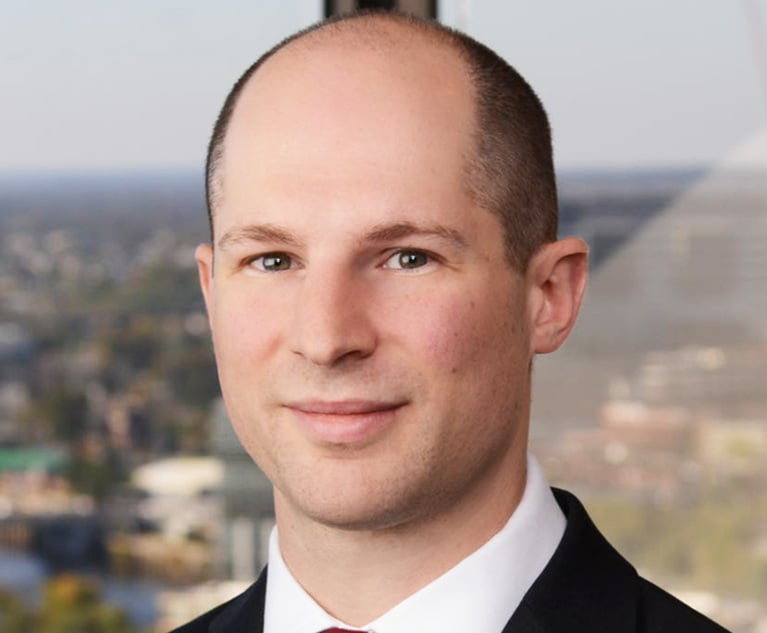Expanded Burden of Proof Clarified in Workers' Comp Modification Actions
The Commonwealth Court has ruled that while employers seeking a modification of workers' compensation benefits based on proof of earning power must show that positions identified in a transferable skills analysis are open and available, a claimant's own testimony about pursuing those jobs could also be used to bolster the employer's case.
January 11, 2018 at 01:14 PM
5 minute read

The Commonwealth Court has ruled that while employers seeking a modification of workers' compensation benefits based on proof of earning power must show that positions identified in a transferable skills analysis are open and available, a claimant's own testimony about pursuing those jobs could also be used to bolster the employer's case.
A divided en banc Commonwealth Court panel held that claimant Dennis Smith's workers' compensation benefits should be reduced from $661 to $336 per week based on the availability of jobs that Smith could perform with his educational and physical restrictions, as identified in a labor market survey by his employer's vocational expert.
Smith, a forklift operator, was injured when boxes fell on him during his employment with Supervalu Holdings. His weekly pay was $992. Supervalu's vocational counselor determined that several other, lower-paying local jobs existed that were a match for Smith's skill set and cited that analysis in recommending lower benefits, according to the Commonwealth Court's opinion.
On appeal, Smith argued that the workers' compensation judge erroneously modified his benefits based on five positions that were identified in the vocational counselor's transferable skills analysis as open and available. The Commonwealth Court said Supervalu was entitled to a reduction in benefits, though it found that the evidence was only sufficient to show that two of those five positions were open and available.
“Because employer established the existence of two open and available jobs within claimant's vocational, physical and medical restrictions, employer is entitled to a modification of benefits based on those two positions,” Judge Robert Simpson wrote in the Commonwealth Court's majority opinion. “As such, rather than averaging the weekly rate of the five positions identified in the labor market survey, as the WCJ did … employer is entitled to a modification of benefits based on the average weekly rate of the two security guard positions.”
The proof establishing the existence of the two open and available jobs came from Smith's own testimony that he inquired in person about two of the positions in the labor market survey, was instructed on how to apply for them, submitted his applications and was interviewed but ultimately not hired.
To support this finding, Simpson cited the Commonwealth Court's December 2017 ruling in Valenta v. Workers' Compensation Appeal Board (Abington Manor Nursing Home and Rehab).
In that case, the court expanded the burden of proof in modification cases by holding that, under the state Supreme Court's 2013 ruling in Phoenixville Hospital v. Workers' Compensation Appeal Board (Shoap), a claimant can present evidence to dispute an employer's claims that comparable jobs were open and available. However, according to Simpson, the Valenta court also “held that if a claimant offers evidence about her experience in pursuing the jobs identified in a labor market survey, the evidence can be considered against her in the overall evaluation of the availability of the jobs.”
“Based on our recent decision in Valenta, we hold that an employer bears the burden of proving all facts entitling it to a modification of benefits, including the continued availability of jobs identified as proof of earning power,” Simpson explained. “However, if a claimant offers evidence about her experience in pursuing the jobs identified in a labor market survey, that evidence can be considered on the issue.”
So, as in Smith's case, ”testimony of an in-person application during which information is exchanged, evidence of follow-up communications between a claimant and a prospective employer which prompt acts or inaction by a claimant, or evidence relating to an interview, may be a sufficient basis for a finding” that a position is open or available, Simpson said.
Simpson was joined in the majority by Judges Renee Cohn Jubelirer, P. Kevin Brobson and Michael H. Wojcik. Judge Patricia A. McCullough wrote a concurring opinion, joined by President Judge Mary Hannah Leavitt.
In that opinion, McCullough concurred with the result of the majority's ruling but disagreed with its analysis of Valenta.
McCullough said she was “concerned that the present majority opinion may be construed as shifting the burden to the claimant to establish that any identified jobs are not open and available, an outcome which is not directed by either Valenta or Phoenixville Hospital.”
“Contrary to the majority, we did not hold in Valenta that 'if a claimant offers evidence about her experience in pursuing the jobs identified in a labor market survey, the evidence can be considered against her in the overall evaluation of the availability of the jobs,'” she wrote. ”Rather, we merely held that, under Phoenixville Hospital v. Workers' Compensation Appeal Board (Shoap), a claimant must be permitted the opportunity to present evidence regarding his/her experience in applying for jobs identified by an employer as being open and available.”
In a dissenting opinion filed by Judge Joseph M. Cosgrove, the judge voiced agreement with McCullough that the majority misread Valenta and misapplied Phoenixville but disagreed with the result of the majority's ruling.
In Phoenixville, Cosgrove said, “the Supreme Court made clear that it was the employer which bore the burden of establishing that 'the jobs identified by the employer's expert witness that the claimant is 'capable of performing' must thus be those jobs that are actually open and potentially available.' … The way the majority applies this principle turns it on its head and allows a mechanism designed to protect the claimant to become a force against him or her. This cannot be what the Supreme Court meant.”
James Welker of Jubelirer, Pass & Intrieri represents Smith and did not return a call seeking comment. Supervalu is represented by Andrew Riley of Dell, Moser, Lane & Loughney, who did not return a call seeking comment.
This content has been archived. It is available through our partners, LexisNexis® and Bloomberg Law.
To view this content, please continue to their sites.
Not a Lexis Subscriber?
Subscribe Now
Not a Bloomberg Law Subscriber?
Subscribe Now
NOT FOR REPRINT
© 2024 ALM Global, LLC, All Rights Reserved. Request academic re-use from www.copyright.com. All other uses, submit a request to [email protected]. For more information visit Asset & Logo Licensing.
You Might Like
View All
While Data Breaches May Lead to Years of Legal Battles, Cyberattacks Can Be Prevented
4 minute read
The Growing PFAS Morass: Why Insurance Should Cover These Products Liability Claims
9 minute read
Trending Stories
- 1Commission Confirms Three of Newsom's Appellate Court Picks
- 2Judge Grants Special Counsel's Motion, Dismisses Criminal Case Against Trump Without Prejudice
- 3GEICO, Travelers to Pay NY $11.3M for Cybersecurity Breaches
- 4'Professional Misconduct': Maryland Supreme Court Disbars 86-Year-Old Attorney
- 5Capital Markets Partners Expect IPO Resurgence During Trump Administration
Who Got The Work
Michael G. Bongiorno, Andrew Scott Dulberg and Elizabeth E. Driscoll from Wilmer Cutler Pickering Hale and Dorr have stepped in to represent Symbotic Inc., an A.I.-enabled technology platform that focuses on increasing supply chain efficiency, and other defendants in a pending shareholder derivative lawsuit. The case, filed Oct. 2 in Massachusetts District Court by the Brown Law Firm on behalf of Stephen Austen, accuses certain officers and directors of misleading investors in regard to Symbotic's potential for margin growth by failing to disclose that the company was not equipped to timely deploy its systems or manage expenses through project delays. The case, assigned to U.S. District Judge Nathaniel M. Gorton, is 1:24-cv-12522, Austen v. Cohen et al.
Who Got The Work
Edmund Polubinski and Marie Killmond of Davis Polk & Wardwell have entered appearances for data platform software development company MongoDB and other defendants in a pending shareholder derivative lawsuit. The action, filed Oct. 7 in New York Southern District Court by the Brown Law Firm, accuses the company's directors and/or officers of falsely expressing confidence in the company’s restructuring of its sales incentive plan and downplaying the severity of decreases in its upfront commitments. The case is 1:24-cv-07594, Roy v. Ittycheria et al.
Who Got The Work
Amy O. Bruchs and Kurt F. Ellison of Michael Best & Friedrich have entered appearances for Epic Systems Corp. in a pending employment discrimination lawsuit. The suit was filed Sept. 7 in Wisconsin Western District Court by Levine Eisberner LLC and Siri & Glimstad on behalf of a project manager who claims that he was wrongfully terminated after applying for a religious exemption to the defendant's COVID-19 vaccine mandate. The case, assigned to U.S. Magistrate Judge Anita Marie Boor, is 3:24-cv-00630, Secker, Nathan v. Epic Systems Corporation.
Who Got The Work
David X. Sullivan, Thomas J. Finn and Gregory A. Hall from McCarter & English have entered appearances for Sunrun Installation Services in a pending civil rights lawsuit. The complaint was filed Sept. 4 in Connecticut District Court by attorney Robert M. Berke on behalf of former employee George Edward Steins, who was arrested and charged with employing an unregistered home improvement salesperson. The complaint alleges that had Sunrun informed the Connecticut Department of Consumer Protection that the plaintiff's employment had ended in 2017 and that he no longer held Sunrun's home improvement contractor license, he would not have been hit with charges, which were dismissed in May 2024. The case, assigned to U.S. District Judge Jeffrey A. Meyer, is 3:24-cv-01423, Steins v. Sunrun, Inc. et al.
Who Got The Work
Greenberg Traurig shareholder Joshua L. Raskin has entered an appearance for boohoo.com UK Ltd. in a pending patent infringement lawsuit. The suit, filed Sept. 3 in Texas Eastern District Court by Rozier Hardt McDonough on behalf of Alto Dynamics, asserts five patents related to an online shopping platform. The case, assigned to U.S. District Judge Rodney Gilstrap, is 2:24-cv-00719, Alto Dynamics, LLC v. boohoo.com UK Limited.
Featured Firms
Law Offices of Gary Martin Hays & Associates, P.C.
(470) 294-1674
Law Offices of Mark E. Salomone
(857) 444-6468
Smith & Hassler
(713) 739-1250






